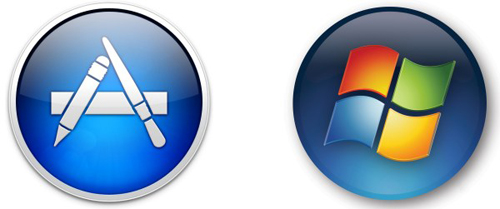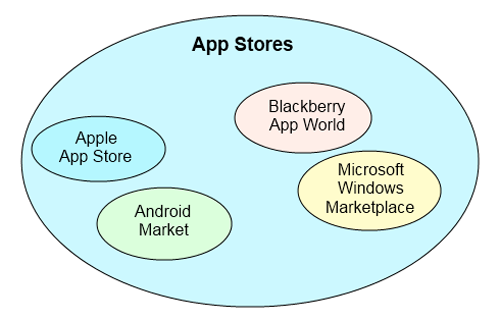业内话题:“App store”和“Windows”是泛指名词吗?
科技公司都在为市场占有率而互有争执,所以为产品取一个普通的名字也会很有风险,因为它会形成一个大家难以规范的普遍传统(例如苹果产品使用的“i”这个前缀)。最近受到质疑的就是苹果“App Store”这个商标,相信大家都知道,App Store是苹果在2008年发布的一个支持独立开发商投放手机应用、游戏等产品的应用商店。
据游戏邦了解,苹果当时也为App Store注册了商标,但自从那以后,该商标就受到了微软的质疑,后者认为苹果无权独自控制这个泛指名词,因为这个词其实也适用于其他应用商店。将App Store与苹果应用商店划等号,好比是Kleenex(游戏邦注:克里奈克斯纸巾品牌)将“纸巾”一词注册为商标一样。但苹果驳回了这种观点,并指出微软最得意的产品Windows也同样违规了。人人都知道Windows原意是窗口,但也可以隐喻电脑操作系统的导航特点。
苹果为App Store辩护的理由很充分:“App Store”或多或少都是因苹果而得名的。该应用商店上线时,市场上还没有其他竞争对手,所以“App Store”在相当长的一段时间中完全等同于苹果应用商店这个概念。另外游戏邦获悉,苹果认为“App Store”也是一种双关语,暗指Apple Store。App Store确实吸引了不少其他竞争对手进军这一市场,但这些竞争者们也不是没有其他命名选择,这一点从谷歌和RIM应用商店名称就可以看出来了。
不过微软的观点也相当理性:你怎么能因为自己的行动比别人更早,就把含义这么广泛的名词注册成商标?“任何一种隐喻或者苹果为‘App Store’所带来的名气,实际上都只是一种隐喻,它不能将‘app store’这种泛指名词转化成一种保护性商标。”换句话说,“App Store”可能并非因苹果得名,而是因为它是一个可描述任何应用商店的通用词,任何一种提供类似服务的产品都可以称为“app store”。
这种说法是不是站得住脚呢?与微软对立的看法是,当然,我们现在会使用这个名词就是因为苹果最先采用了。这是一个关于创新或模仿的蛋生鸡,鸡生蛋悖论。说实话,这个观点在科技行业还是很少有争议的,每100个产品中就是99个属于仿制品。
尽管苹果反击微软Windows这一论点所涉及的因素略有不同,但实际上也极为相似。与苹果一样,微软让“window”一词成名,但也并没有发明“窗口”这种文件系统导航方法。你可以在一个窗口中看这个东西,但可能不会在Windows浏览这些内容。尽管还有viewer、panel、tab等其他可用的词语,但微软并不要求用户认为,他们的应用程序或者操作系统打开了一个窗口。另外,“windows”也并不是操作系统的卖点,不过假如苹果因为自己的OS X操作系统也有窗口,也将其修改为“Windows OS X”,相信微软也会反弹的。
苹果究竟是否可宣称他们普及了“app”一词?这个问题有待争论。“app”只是“application”的一个缩写而已,而且大家很早之前就在使用这个缩写了。
再进一步讨论,App Store不是在iTunes Store环境中运营的吗?在iTunes的“音乐”和“电影”版块旁边有一个“Apps”版块,所以它并不是一个独立的应用商店,它和音乐、电影版块并没有什么两样。iTunes让在线音乐所有权闻名于世,但苹果为何不将其注册为“Music Store”呢?它们的情况不是很类似吗?
像这种普通名词变成注册商标的例子还有不少,比如Lego、Frisbee、Tazer等。但这些词语与它们品牌本身的内容或服务并没有多大关联。苹果看来也有意向这种方向发展,目前还不知道苹果的商标是否合法、正确,有可能两者俱全,或者仅满足其中一个条件。游戏邦认为这是一个非常微妙的话题。有人认为,“App Store”只是一个普通的名字,仅含一点点原创性。
不知各位的想法如何呢?微软的Word和Office商标是不是也同样有问题?还是说苹果过度引申这个话题了?(本文为游戏邦/gamerboom.com编译,转载请注明来源:游戏邦)
Is “App Store” As Generic As Microsoft’s “Windows”?
As tech companies fight for ubiquity, it’s no surprise that there should be disputes like this. Using common words for product names is always a risk, as is establishing generic traditions (like Apple’s “i-” prefix) that are difficult to regulate. At stake today is Apple’s trademark on “App Store,” which as I’m sure our readers are aware, was established in 2008 as arguably the first real platform through which independent developers could offer mobile applications, games, and so on.
They filed for the trademark at the same time. Since then, however, it has been contended by Microsoft in particular that Apple has no exclusive right to so generic a term, one which arguably could apply to any other mobile application store. It’s as if Kleenex trademarked “tissue” as well. Apple just turned the argument around, however, noting that Microsoft itself is maintaining a plainly generic term for its most prominent product: Windows. Windows, as we all know, are both transparent portals allowing light to pass from outside to inside, and a visual metaphor for navigating a computer operating system.
It’s a point worth considering. But not the only one.
Apple has a strong case: “App Store” was more or less popularized by them. There were no competitors for some time so “App Store” referred only to Apple’s for quite a long time. “App Store” is also (they say) a “double entendre” meant to evoke the Apple Store. That one surely got some eye rolls in the industry. Still, the term wasn’t chosen arbitrarily. And competitors have options, as evidenced by the names the likes of Google and RIM have come up with.
Microsoft’s claims are equally rational, though: can you really trademark such a broad term, just by being the first one there? “Any secondary meaning or fame Apple has in ‘App Store’ is de facto secondary meaning that cannot convert the generic term ‘app store’ into a protectable trademark.” In other words, “App Store” didn’t blow up because of Apple, but because it’s the term anyone would reach for when describing something of this type. It’s telling (but not legally obligating) that every similar service could also be called an “app store.” Observe this beautiful Venn diagram:
Surely that counts for something? The counter-argument is, of course, that we use that term now because it’s the term Apple made us use. It’s a chicken-egg argument of innovation or imitation. Let’s be honest, though, in the tech industry that’s rarely much of an argument. 99 times out of 100 it’s imitation.
Apple’s jab at Microsoft over the term Windows has slightly different factors, but it really is remarkably similar. Like Apple, Microsoft popularized but did not invent the “window” method of navigating a file system. You’re viewing this in a window, though you may not be viewing it in Windows. But Microsoft doesn’t go after people who say their application or OS opens a window, though there are equally applicable words: viewer, panel, tab. But “windows” are hardly a selling point now for OSes, and of course if Apple decided to change the name of OS X to “Windows OS X” because it has windows, Microsoft would have kittens.
Perhaps Apple can lay claim to popularizing the word “app”? That’s questionable. It’s just a diminutive of the term application, a term in use long before.
Furthermore, doesn’t the App Store operate under the umbrella of the iTunes Store? Look, in iTunes there’s an “Apps” section, next to Music and Movies. It’s not a separate store, really, any more than the music and movies sections are separate from each other. iTunes helped popularize online music ownership, yet Apple didn’t attempt to trademark “Music Store.” Isn’t it analogous?
There are numerous examples of trademarks becoming common words: Lego, Frisbee, Tazer. But these are nonsense words. They don’t refer to what they do. Apple seems to be attempting to do just this. It’s not clear whether Apple’s trademark is lawful, right, both, or neither. It’s a very nuanced issue. My personal opinion would be that “App Store” was generic to begin with but only had a sort of frosting of originality on it. But it’s a distinction of exceeding niceness, and a little argument might sway me the other direction.
What do you guys think? Is this a pot and kettle situation for Microsoft, with its Word and Office trademarks, or is Apple overreaching?(source:crunchgear)









































 闽公网安备35020302001549号
闽公网安备35020302001549号